
Launching a new website in 2015? Congratulations! Although launching a new site can be a slightly stressful experience, it can also be tremendously exciting. There are few better feelings in business or life than going from nothing to something overnight. In effect, this is exactly what happens when you launch a new site.
If you intend to attract visitors to your website from search engines, you probably already know that you’re going to need a link building strategy. Fortunately, you’ll be starting afresh with your new site so there will be many untapped link opportunities available to you when you launch. I’m going to do my best to outline those for you today.
Before I get started though, let’s get a few link building ground rules out of the way:
Rule #1: Tell the world about your site – but don’t ask for links directly!
If in doubt, always abide by this rule. Sure there will be exceptions. But generally speaking, emailing a stranger and asking for a link is the online equivalent of knocking on someone’s door and asking them to get to know your favourite bearded deity. People tend to find it a little bit annoying.
Rule #2: Get Links from REAL Websites
You know that blog with the content that’s so mundane it’s humourous? The one plastered with Adsense ads and links to “engagement rings” in one post and “accountants in Surrey” the next? Yeah, don’t get a link from that site.
Now that we’ve got the rules firmly established, let’s get on to the good stuff – acquiring quality links to your site that will boost both your direct and search engine traffic.
1. Leverage Your Network/Offline Relationships
Before you rush to start building relationships online, think about the people you already know in real life.
The very first step in any link building campaign should be to make a list of the relationships and assets you already have, and figure out how to leverage them to help promote your website.
It should go without saying that people are much more likely to link to you if they already know you. Here are a few people you should consider getting in touch with:
- Friends & family
- Facebook friends
- Twitter followers
- Friends from High School/University
- Usergroups (i.e. LinkedIn, Facebook, Meetup.com)
- Sports teams
- Societies & institutions
- Suppliers – e.g. cleaning company, IT supplier, couriers, printer (consider providing a testimonial that these companies can use on their websites, with a link back to your own site).
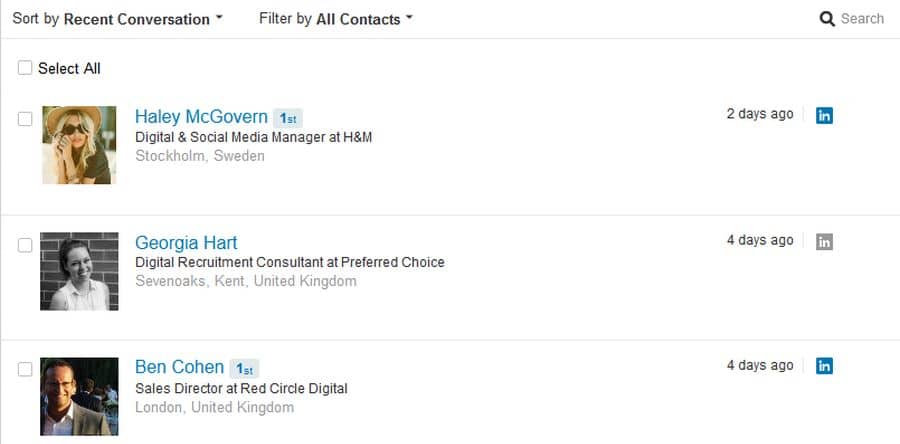
Remember that not everyone mentioned above will be in your target market – but that doesn’t mean they won’t know people who are.
Another equally strong benefit of leveraging your existing contacts is to gain valuable qualitative feedback soon after launch. Rally your network together and ask them to try/test your product. This will also help encourage early adoption.
2. Forums & Online Communities
Regardless of who your target audience is, they probably already hang out somewhere online. Find out where and go join them.
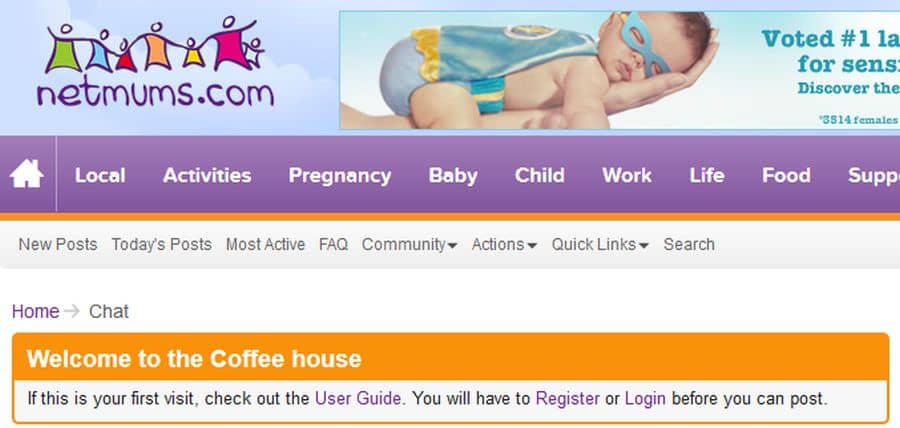 Here are some advanced search queries you can use to find relevant forums and groups:
Here are some advanced search queries you can use to find relevant forums and groups:
- inurl: + keyword + forums or groups
- intitle: + keyword + forums or groups
When you enter these places it’s advisable to listen first before you speak. Get a feel for the discussion, ask and answer questions, and then tell your story. Don’t be the person who signs up, spams a link to their own website and then vanishes into the night, never to be seen again.
3. Go Local
If your business has a physical location, take advantage of it and get active in your local community. Join your local chamber of commerce, help local charities and sign up to local directories. If you’re doing something positive in your community, make sure the local press knows about it.
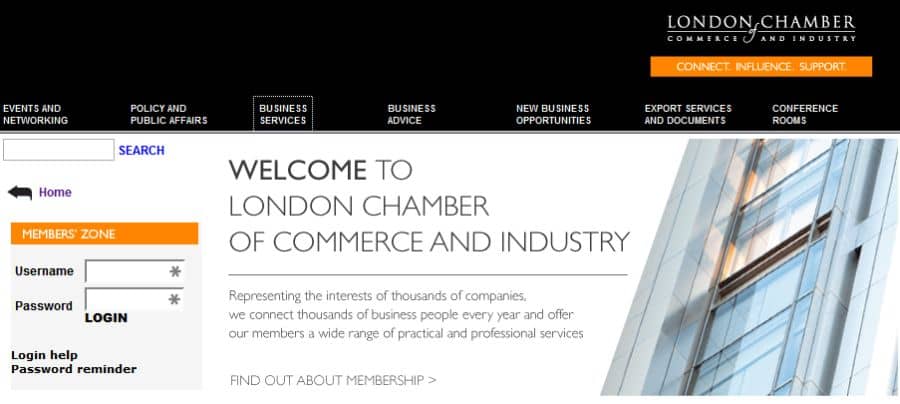 Here are some people you should get to know:
Here are some people you should get to know:
- Local council
- Local Chamber of Commerce
- Local newspaper
- Local college or university
- Local sports clubs
- Local business directories
- Local community groups
- Local charities
- Local businesses
4. Donate to Charity
We touched on this above, but don’t feel you are limited to only helping charities in your own local area. There are many national and international charities who will gladly link to you in exchange for a small donation.
I’d probably avoid doing this one at scale (Google wouldn’t like it and some people would probably find it a tad dishonourable). However, if done tastefully, it’s win/win for both you and the charity.
Here are some advanced search queries you can use to find charities to donate to:
“donate to us”
“contributors page”
“sponsors page”
allintitle: “contributors”
allintitle: “sponsors”
5. Competitor Link Building
Most people reading this blog are already likely to be familiar with this tactic. If that’s you then feel free to skip ahead. Otherwise, here’s a quick low-down:
- Find sites linking to your competitors that should also be linking to you – you’ll find this information by using backlink analysis tools such as Open Site Explorer, Majestic and Ahrefs. There are some free ones about too.
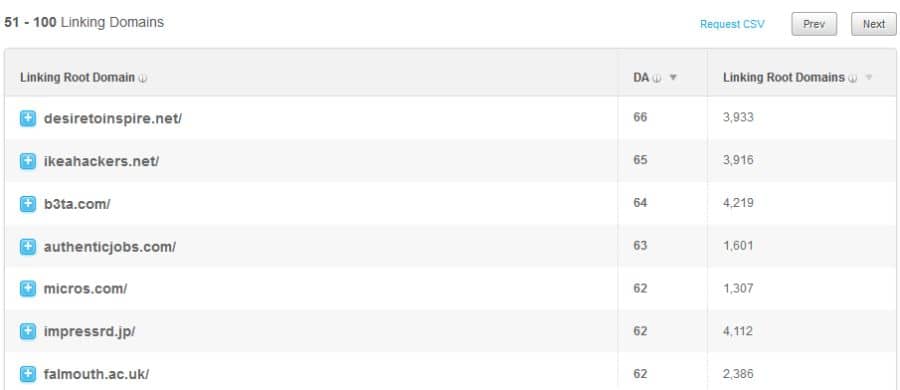
- Create a prioritised list – which pages make the most sense for your site to be listed on? Look for suppliers, resource lists and organisations you’ve dealt with before.
- Find each site’s contact details – if these are not listed on the website’s “contact us” page, check the site’s Whois record and social media accounts.
- Start outreaching – contact the quick wins first i.e. the sites most likely to link to you
- Follow-up – most webmasters will require re-prompting a few times before you even get a response.
- Note: Different sites/links will require a different approach – is the link coming from a guest post? An editorial mention? A product review? In each case, the best approach to take will vary considerably. Read some great outreach examples here.
6. Unlinked Mentions
Has somebody already mentioned you, your brand or your product online prior to the launch of your website? If the answer is yes, you should proactively reach out and politely ask if they will turn the mention into a link.
Here are a few search queries to help you find out where you have been mentioned on the web:
“your name”
“employee name”
“brand name”
“brand name” blog OR post
“former company name”
For more search engine query ideas, check out this post: www.optimizesmart.com/10000-search-engine-queries-for-your-link-building-campaign
Also be sure to set up Google Alerts so you don’t miss when your brand or website are mentioned in the future!
7. Trade Shows
If you’ve just launched, now is the perfect time to get out there and meet potential customers in person. Trade shows can be a great opportunity to do this, so be sure to look out for any that run in your sector.
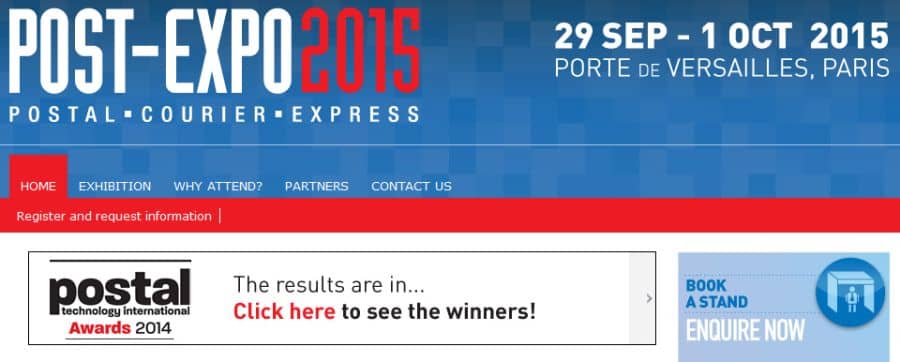 If you do decide to participate in a trade show, make sure you get a good listing on the show’s website – preferably with a link back to your own site!
If you do decide to participate in a trade show, make sure you get a good listing on the show’s website – preferably with a link back to your own site!
8. Directories
This one always requires further clarification. I wouldn’t recommend submitting to the vast majority of general web directories these days. The risks simply outweigh the rewards.
However, there are still plenty of solid niche and local directories that are well worth submitting to. Leaving the debate about purported SEO benefits aside, these directories can be a reliable source of targeted referral traffic, which is fantastic when your site is still in its infancy.
To ensure you’re only submitting to directories that are not going to harm your website’s performance, stick to the following criteria:
- Local/Niche – make sure the directory only services your country and/or industry. General international directories are best avoided.
- Ranks number one in Google for its brand name – if it doesn’t rank number one, or worse, doesn’t appear on Google’s first page for a brand search, there’s a high chance it has a Google penalty. Gaining links from penalised websites can seriously hamper your own website’s performance.
- Capable of sending direct traffic – you can get a rough estimate of how many visitors a website receives from SEMRush. If the directory itself is only receiving a few hundred visits a day, it’s probably not likely to send you much traffic either.
Here are a few examples of niche and local directories that have been a reliable source of referral traffic for my clients:
Niche
Also bear in mind that submitting to local directories will help your website rank better in local search results if you operate from a fixed location.
9. HARO (Help a Reporter Out)
Is your company doing something truly press-worthy? There are many companies out there who are quietly doing interesting things and breaking new ground. Unfortunately, unless you make a bit of effort the media is unlikely to find out about it.
That’s where Help a Reporter Out (HARO) comes in. HARO is a platform that helps nearly 30,000 journalists find sources for their news stories.
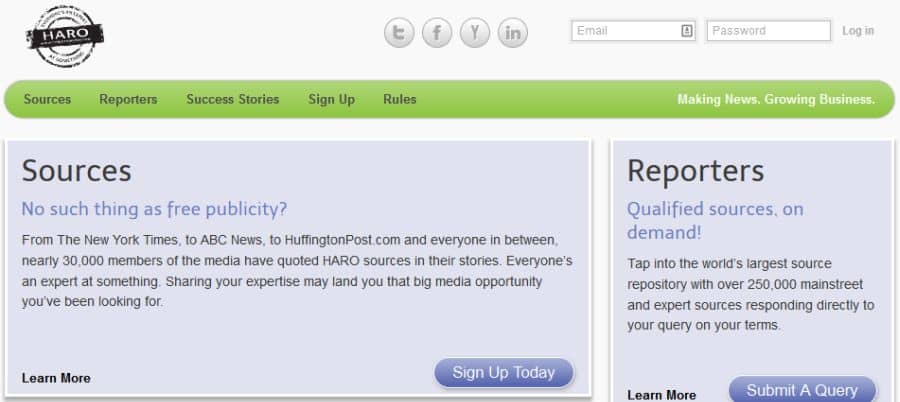 Once you’ve registered as a source, you simply select the topics you feel you could provide some insight into. Then HARO will start sending you daily emails with related queries from journalists.
Once you’ve registered as a source, you simply select the topics you feel you could provide some insight into. Then HARO will start sending you daily emails with related queries from journalists.
If you see a query you think you could answer with some authority, take the time to respond. You may be selected by the journalist for an interview which will earn you valuable publicity and one strong editorial link at the very least.
10. Edu Resource Links
Many university websites have resource pages containing links to sites that may be helpful to their students. If you feel your website is genuinely relevant to one of these pages, there is no harm in approaching the university and asking to be listed.
Here are some advanced search queries that will help you find these opportunities:
site:.edu “your keyword”
site:.edu “your keyword” + “resources”
site:.edu “your keyword” + inurl:links
site:.edu “your keyword” + “recommended resources”/”suggested resources”
site:.edu “your keyword” + “useful resources”/”interesting resources”
site:.edu “your keyword” + “favourite resources”/“favourite sites”
site:.edu “your keyword” + “recommended sites”/”suggested sites”
site:.edu “your keyword” + “useful sites”/”interesting sites”
site:.edu “your keyword” + “recommended websites”/”suggested websites”
site:.edu “your keyword” + “useful websites”/”interesting websites”
site:.edu “your keyword” + “favourite websites”
11. Your Suppliers & Manufacturers
This is a generally a quick win, particularly if you have a good relationship with your suppliers.
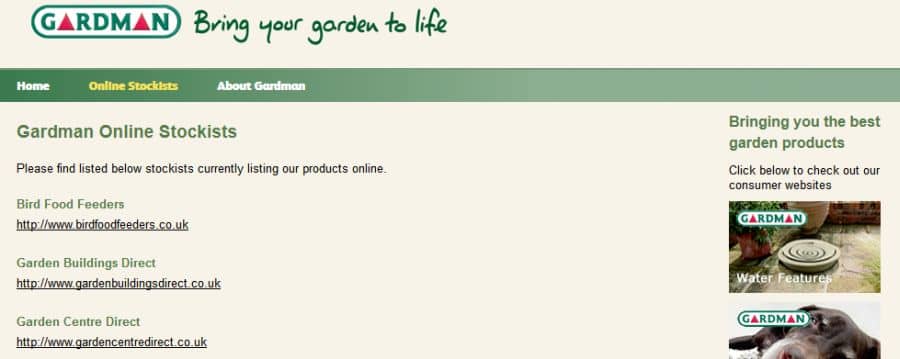 It’s always best to get in contact with the person from the company you deal with directly. If you don’t have any close connections in the company, try to find the most relevant person to deal with your request. This will usually be the company’s webmaster, but you should CC any relevant decision-makers into your email.
It’s always best to get in contact with the person from the company you deal with directly. If you don’t have any close connections in the company, try to find the most relevant person to deal with your request. This will usually be the company’s webmaster, but you should CC any relevant decision-makers into your email.
Try and make your request as straight-forward as possible:
Hi (webmaster’s name),
I’m not sure if you are the right person to speak to about this, but perhaps you can point me in the right direction.
We recently launched our new website and I noticed we are not listed as an official (company name) stockist yet: http://companywebsite.com/dealers.
We will be doing a lot to promote your products in the coming months so we just want to ensure our customers can verify that we are an official stockist.
Thanks in advance for your help.
Kind regards,
(Your name)
12. Your Dealers
If your business operates supplier-side, develop a good relationship with your dealers and teach them how to do well selling your product. In exchange, ask them to link back to your website.
13. Your Agencies (Design, Marketing etc.)
Web agencies tend to place a text link to advertise themselves in the footer of the websites they develop. If they are doing this on your site, it’s only fair that they link to you in return!
Get in touch with them and make sure your website is on their client list or portfolio page. If they need an additional incentive, provide them with a short testimonial.
Even if your agency isn’t highly relevant to your own industry, it will often have an authoritative website that you can gain a link from with minimal effort.
14. Add Exotic (i.e. Weird) Products
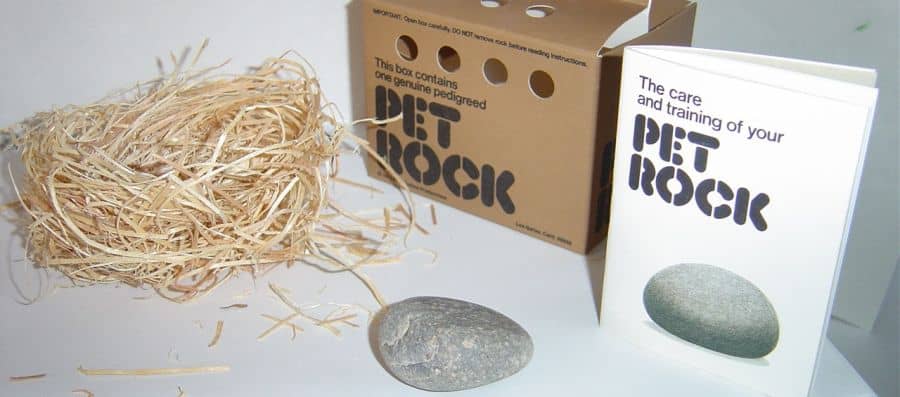 Let’s face it, not every company is terribly exciting or on the cutting edge of innovation. If most of your products are fairly generic (i.e. boring) you are going to have to work harder than most to get people to link to your website.
Let’s face it, not every company is terribly exciting or on the cutting edge of innovation. If most of your products are fairly generic (i.e. boring) you are going to have to work harder than most to get people to link to your website.
So why not be daring and add a product to your inventory that will attract attention? Even if it’s not an item that’s likely to generate many sales, you can still use it to gain publicity and build brand recognition. Do this and the links will follow.
15. Boring Industry Magazines
Did you know that even the most boring industries on the planet have magazines? From facilities management to couriers, you can bet every major industry will have a least one magazine dedicated to it.
The good news is, it’s generally a lot easier to get coverage in industry magazines than it is publications targeting consumers. Target the magazines’ editors with your latest press releases and develop relationships with them. This can result in some great links.

16. PR
So much can be said about attracting links through PR and it’s already been said better elsewhere.
However, to sum it up in a few short points:
- Be news-worthy – actually having something to say is a good start when doing PR!
- Be first – be “first” if you can. Admittedly this is very difficult to do, but pays dividends. If you can’t be first, see the next point…
- Follow trends – jump on the back of the latest trends and adapt them to your own niche.
- Use press releases – write and distribute press releases regularly whenever you have any news to share.
- Think announcements
- announce a new website
- announce a new product or service
- announce a new partnership or hire
- Headlines are everything – capture the problem, benefit and audience in the headline and subheading.
- Include quotes – journalists love them. Use relevant quotes wherever possible in all your PR material.
- Include a media kit – journalists are busy people. Make their lives easier by creating a press pack to distribute during your outreach and make it downloadable from your website. Your media kit should contain things like:
- Company mission
- Logos
- Company background
- Founder bios
- Founder headshots
- Industry expert quotes
- Product information
- Product screenshots
- Customer feedback/testimonials
- Case studies
- Market statistics
- Competitors overview (yes, mention your competitors! They’ll get mentioned whether you like it or not anyway. By mentioning them in your own PR material you not only make life easier for the journalist, but also have some control over who you’re stacked up against in your media coverage!)
- Company strengths and weaknesses
- Artwork
- Anything else that will make writing an article on your company practically effortless
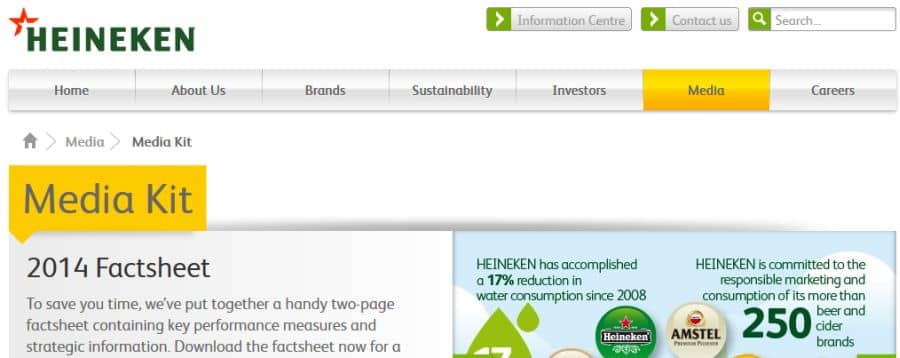
- Research before you pitch – find out about the journalist and their latest work, and mention it in your pitch.
- Speak their lingo – learn to speak using journalism lingo including terms like “exclusive”, “embargo” and “on a deadline”.
17. Reciprocal Links from Sites Related to Yours
To some people this might seem like a controversial suggestion. Indeed Google’s list of link schemes advises against participating in “excessive link exchanges”.
However, despite what the web police say, websites linking to each other is actually a common, naturally occurring phenomenon online. If you reach out to your friends on the web and ask for a link, it’s only fair that you link back to them in return.
However, to stay safe you need to adopt the mentality that reciprocal links are not for SEO-benefit. Instead, think solely about direct traffic and promotion i.e. “if search engines didn’t exist, would I still want a link from this website?”
Here are some more rules to stay safe:
- Stick to reciprocal links from people you already know and authoritative websites only.
- Avoid reciprocal links from low quality sites (i.e. sites that lack authority, popularity and/or trust).
- Avoid link schemes – if the site advertises swapping links, it’s best to steer clear.
- Try and get other sites to link to you first i.e. be the reciprocator.
18. Resource Lists & Links Pages
Many websites will have a recommended resources or links page. If you believe your website or a page on your site would be a genuinely worthwhile inclusion to one of these pages, there is no reason not to reach out and ask to be listed. The more relevant your resource is to the page, the better chance you’ll have of being included.
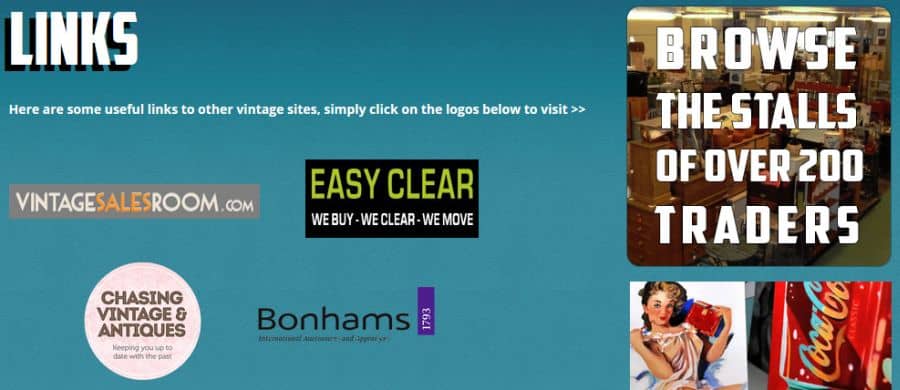 Note that you’ll also have a much higher success rate if you develop a relationship with the webmaster first. It’s all about the long game! So leave genuine blog comments, exchange advice via email or help out the webmaster in some way before asking them to link to your site.
Note that you’ll also have a much higher success rate if you develop a relationship with the webmaster first. It’s all about the long game! So leave genuine blog comments, exchange advice via email or help out the webmaster in some way before asking them to link to your site.
Here are some search queries to help you identify link opportunities via resource lists:
Keyword + “recommended resources”/”suggested resources”
Keyword + “useful resources”/”interesting resources”
Keyword + “favourite resources”
Keyword + “recommended sites”/”suggested sites”
Keyword + “useful sites”/”interesting sites”
Keyword + “favourite sites”
Keyword + “recommended websites”/”suggested websites”
Keyword + “useful websites”/”interesting websites”
Keyword + “favourite websites”
Keyword + “recommended articles”/”suggested articles”
Keyword + “useful articles”/”interesting articles”
Keyword + “favourite articles”
Keyword + “recommended links”/”suggested links”
Keyword + “useful links”/”interesting links”
Keyword + “favourite links”
19. Run a Competition
It shouldn’t come as any surprise that competitions and giveaways are both great ways to attract links. This works especially well if you have an awesome product, but if you don’t there are plenty of other prizes you can use. Some ideas include:
- Tickets – sporting events, movies, exclusive events
- Gym memberships, software subscriptions (e.g. Spotify, Netflix)
- Partnerships/cross promotions – raffle off a partner’s product (this is one of the most effective ideas – approach suitable partners first and offer them a chance for co-publicity and links)
To run a competition, the simplest way is to have entrants visit your website, fill in their details and perhaps answer a question or two. You can then draw the winner at random.
To promote your competition, start by listing it with a few ‘comping’ communities. These are easy enough to find through a simple Google search. Here are a few you could check out:
http://www.theprizefinder.com/
http://www.competitionstoday.co.uk/
http://www.hotukdeals.com/all/competitions/discussed
 The next step is spreading the word. Get on Twitter and get in contact with bloggers you already know or who have an audience that would be interested in your prize. The better the prize, the more uptake you are likely to have.
The next step is spreading the word. Get on Twitter and get in contact with bloggers you already know or who have an audience that would be interested in your prize. The better the prize, the more uptake you are likely to have.
***Additional bonus strategy***
Does running a competition sound like too much effort? An alternative strategy is to piggy-back off someone else’s competition by donating an additional prize. You can then ask them kindly to link back to you as a prize donor when they are promoting the competition.
To find opportunities like this, combine search terms like ‘win’ and ‘competition’ with keywords related to your industry e.g. “win garden furniture” if you are in the gardening business.
20. Advertise a Job/Create a “Jobs” page
Advertising a career opportunity is a great way to give your brand additional exposure and attract links. Here are some tips on how to use job advertising to your advantage:
- Use job classifieds sites – There are countless job classifieds sites and jobs boards online. If you are looking to hire somebody, be sure to advertise on as many free job boards as you can. Search for terms like “free job advertising” or “free job boards” to find places to submit your ad. Some of these sites will offer a dofollow backlink to your site, but could also give your company exposure that generates additional links.
- Create a jobs page – another way to acquire links through job advertising is to create a careers page on your own website. You can then reach out to universities and careers sites and ask them to link to your page so graduates and job seekers can keep up to date with your latest opportunities.

- Create an advert that gets attention – consider creating a daring or humorous job advertisement that will generate some real publicity. This is an inexpensive way to do some clever PR and the tactic is used regularly by big companies, from Apple to McDonalds. Type “funniest job adverts” into Google for some inspiration, or check out this post. Bottom of Form
Now go get those links!
These are just a few link opportunities I recommend pursuing if you’re launching a new website in 2015. Hopefully, you’ve found them useful and applicable to your industry.
Resources
http://www.seomark.co.uk/get-backlinks/
http://blog.surepayroll.com/growth-hacks-small-businesses-can-implement/
http://searchengineland.com/public-relations-for-seo-the-complete-guide-part-1-154130
http://kaiserthesage.com/images-link-building/
http://justinbriggs.org/33-links-and-how-to-get-them
http://backlinko.com/17-untapped-backlink-sources
https://websiteadvantage.com.au/Link-Building-Brainstorm
http://digitalphilippines.net/link-building/
http://moz.com/blog/running-giveaway-competitions-for-links-and-seo


